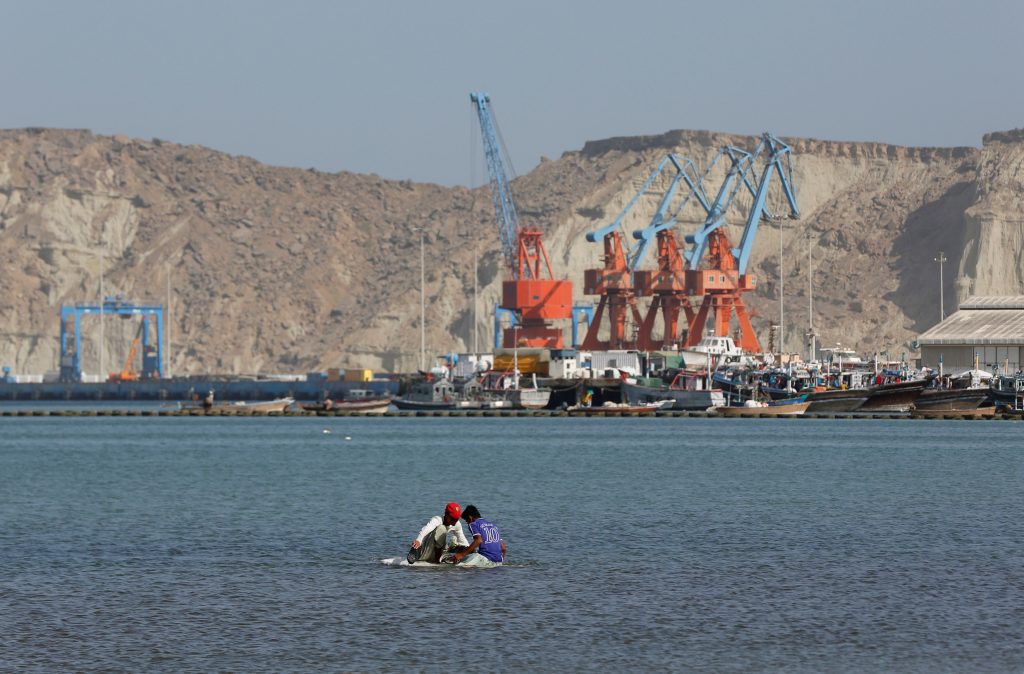Pakistan, Teetering on Insecurity Stilts
"Pakistan is facing a triple crisis. It's facing a threat from the Pakistani Taliban. A collapsing economy; And, polarization and political chaos on the street.""Pakistani leaders seem woefully unprepared for tackling the challenge and continue to fight each other rather than finding solutions for the country"Farahnaz Ispahani, former Pakistan parliamentarian"Looking at the seven years from FY16 to FU22. Pakistan's cumulative current account deficit was $74.5 billion, while the State Bank's forex reserves fell by $3.6 billion during this period.""This means Pakistan needed financing of $70.9 billion, and borrowed $65 billion.""Foreign investment barely financed the external deficit, so the government just kept borrowing.""Since foreign creditors are reluctant to continue lending, Pakistan's external sector has become unsustainable."Dawn, Pakistan's leading English language newspaper
 |
| The banned militant group Tehreek-e-Taliban Pakistan (TTP) has ended a
cease-fire agreement with the government, and vowed to launch attacks
across Pakistan. What will this mean for the country's economy? DW.com |
Pakistan,
one does best to recall, is a seething cauldron of backward Islamists.
Violence and uninhibited threats percolate on the streets of Pakistan's
cities when fiery-throated Islamists go about preaching jihad while
deploring the presence of western-style shops selling music, and where
male and female friends congregate together in restaurants. A country
where the minority Christian population is threatened and persecuted
when haters can accuse Christians of denigrating the Prophet Mohammad
and face a death penalty.
The
successive governments of Pakistan plotted against Afghanistan, anxious
their neighbour not form an alliance with India. Pakistan invested
itself in forming, training and arming the Afghan Taliban, giving its
leaders haven at a time that US. forces led an international, UN-NATO
force to dislodge the Taliban and al-Qaeda's Osama bin Laden who took
credit for planning the aerial attacks against the World Trade Center in
New York, the Pentagon in Washington.
Osama
bin Laden himself had sanctuary in Pakistan where his family compound
was discovered in Abbottabad, not far from an elite military academy. A
Pakistani doctor whose own home was next to the bin Laden compound, a
secret location for an 'unknown' occupant, helped the CIA identify that
unknown occupant whom Navy Seals subsequently dispatched. The Pakistani
doctor was arrested, held responsible as a traitor, and incarcerated.
Pakistan's
military with its embedded Intelligence Agency, was well infiltrated by
their own Taliban, as radical a group of hardcore Islamists as the
Afghan Taliban. As a nuclear nation the very prospect of these
terrorists potentially having access to Pakistan's nuclear arsenal is
mind-boggling. The Taliban threat that Pakistan now faces is one that
emerged many years ago, its growth to the point where it challenges the
government of Pakistan, just as Afghanistan experienced with the
viperous group Pakistan bequeathed to its neighbour.
Now,
the Islamic Republic of Pakistan with its immense population of close
to 233 million. occupying a land mass of 881,913 square kilometres faces
an existential crisis brought about by its own incapacity to govern
itself wisely and well. Its focus on its hostility with India from which
it broke away in 1947 following British rule leading to a cataclysmic
separation and the retaliatory deaths of countless Muslims and Hindus
has kept the threat of resurgent conflict alive, over the mutually
contested Kashmir.
Pakistan's
army has been the traditional fount of emerging leaders. Since its
independence there have been three military coups and four military
rulers. One of its non-military rulers, Benazir Bhutto, was assassinated
by raging fanatical Islamists. Pakistan is currently in a state of
political and financial collapse. Former prime minister Imran Khan whose
tenure came to a forced halt in April 2022 through a non-confidence
parliamentary vote imprisoned other politicians including one of his
predecessors, Nawaz Sharif, along with Maryan Nawaz Sharif, the
daughter.
Now
presiding as Prime Minister of Pakistan is younger brother Shehbaz
Sharif. A turf war between Khan's Pakistan Tehreek-e-Insaf political
party and a coalition of opposition parties, the Pakistan Democratic
Movement, has Pakistan at a political standstill. The Pakistani army
sides with the U.S. State Department, and Khan was leading the country
into a Russia-Chinese camp. Unseated from power he encourages supporters
to violent encounters with the law.
Inadequately
governed, Pakistan's institutions are collapsing; educational
institutions in particular. High unemployment, poverty and an increase
in the Consumer Price Index of 31.5 percent has sent more families into
poverty. What the country desperately needs is guidance from a
secular-minded, seriously capable leader who can lead it toward
normalization with India and the establishment of diplomatic relations
with Israel.
And
what the world needs from Pakistan, is the accepted presence of an
internationally designated body of specialists to manage Pakistan's
nuclear arms in the assurance that should its condition further
destabilize those nuclear arms will not be seized by the fanatics
crawling about in huge disruptively threatening numbers in Pakistan.
 |
| In the midst of yet another economic crisis, Pakistan is currently
facing significant upheaval in the political, economic, and security
domains. Amplified by near-historic polarization among ruling elites,
the rapidly deteriorating situation has significant implications on
near- and long-term Chinese influence in the country. Atlantic Council |
Labels: Economic, Islamic Republic of Pakistan, Nuclear, Political, Taliban, Turmoil

<< Home